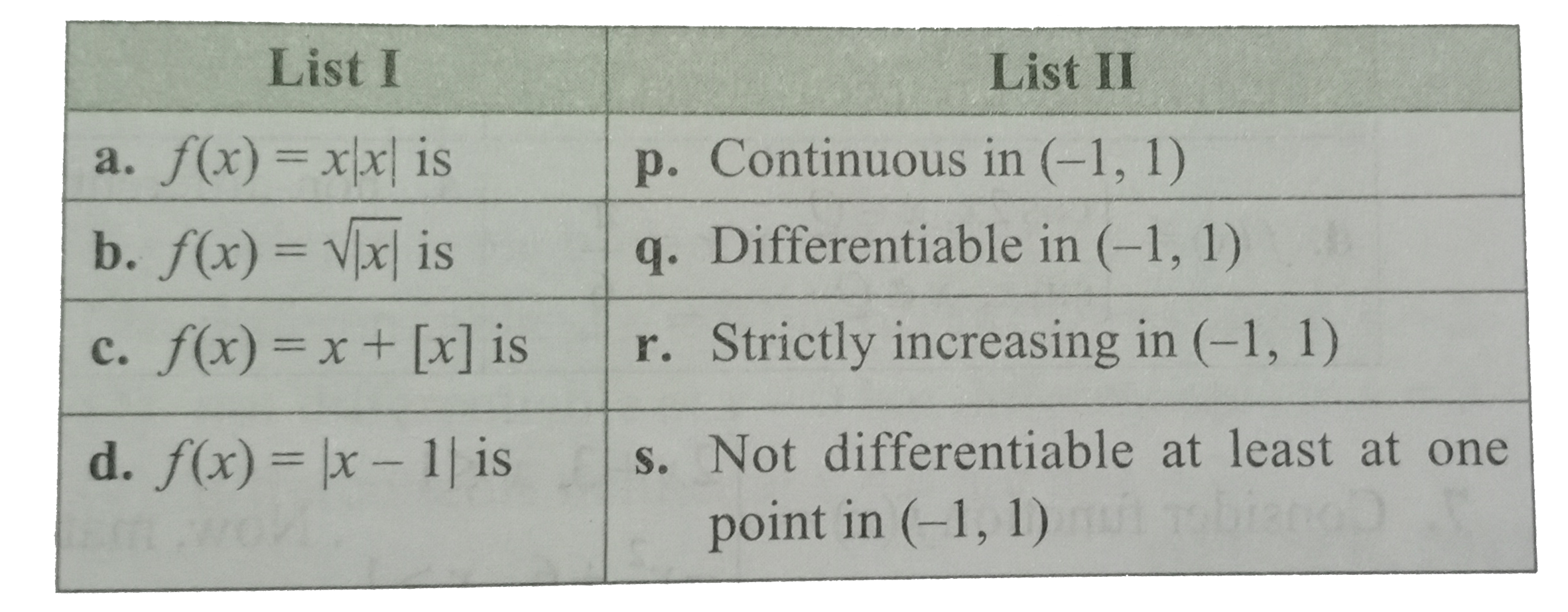If a and b are positive and [x] denotes greatest integer less than or equal to x, then find limx→0+xa[bx].
To solve the limit limx→0+xa(bx), where a and b are positive constants and (x) denotes the greatest integer less than or equal to x, we can follow these steps:
Step 1: Rewrite the greatest integer function
The greatest integer function can be expressed as:
(bx)=bx−{bx}
where {y} denotes the fractional part of y. Thus, we can rewrite the limit as:
limx→0+xa(bx−{bx})
Step 2: Simplify the expression
Substituting the expression for the greatest integer function into the limit gives:
limx→0+xa(bx−{bx})=limx→0+xabx−a{bx}
Step 3: Multiply numerator and denominator by x
To simplify further, multiply the numerator and denominator by x:
=limx→0+x2ab−ax{bx}
Step 4: Analyze the limit as x→0+
As x→0+:
- The term bx approaches infinity, hence {bx} oscillates between 0 and 1.
- The term ax{bx} approaches 0 because x approaches 0.
Thus, we can simplify the limit:
=limx→0+x2ab−0=limx→0+x2ab
Step 5: Evaluate the limit
Now, we can evaluate the limit:
=1ablimx→0+x2=0
Final Result
Thus, the limit is:
limx→0+xa(bx)=0
The greatest integer function can be expressed as:
(bx)=bx−{bx}
where {y} denotes the fractional part of y. Thus, we can rewrite the limit as:
limx→0+xa(bx−{bx})
Substituting the expression for the greatest integer function into the limit gives:
limx→0+xa(bx−{bx})=limx→0+xabx−a{bx}
To simplify further, multiply the numerator and denominator by x:
=limx→0+x2ab−ax{bx}
As x→0+:
- The term bx approaches infinity, hence {bx} oscillates between 0 and 1.
- The term ax{bx} approaches 0 because x approaches 0.
=limx→0+x2ab−0=limx→0+x2ab
Now, we can evaluate the limit:
=1ablimx→0+x2=0
Thus, the limit is:
limx→0+xa(bx)=0
Topper's Solved these Questions
- LIMITSBOOK - CENGAGE ENGLISHCHAPTER - LIMITSEXERCISE - Solved Examples
15 Videos
- LIMITSBOOK - CENGAGE ENGLISHCHAPTER - LIMITSEXERCISE - EXERCISE 2.1
10 Videos
- JEE 2019BOOK - CENGAGE ENGLISHCHAPTER - JEE 2019EXERCISE - Chapter 10
9 Videos
- LINEAR COMBINATION OF VECTORS, DEPENDENT AND INDEPENDENT VECTORSBOOK - CENGAGE ENGLISHCHAPTER - LINEAR COMBINATION OF VECTORS, DEPENDENT AND INDEPENDENT VECTORSEXERCISE - DPP 1.2
10 Videos
Similar Questions
If [x] denotes the greatest integer less than or equal to x, then [log106730.4]=
View SolutionLet [x] denote the greatest integer less than or equal to x. Then, ∫1.50[x]dx=?
View SolutionLet [x] denotes the greatest integer less than or equal to x and f(x)=[tan2x]. Then
View SolutionIf f(x)=⎧⎨⎩sin[x][x], for [x]≠00, for [x]=0where [x] denotes the greatest integer less than or equal to x. Then find limx→0f(x).
View Solutionlet [x] denote the greatest integer less than or equal to x.
Then limx→0tan(πsin2x)+(|.|x−sin(x[x]))2x2
View SolutionIf [x] denotes the greatest integer less than or equal to x,then the value of limx→1(1−x+[x−1]+[1−x]) is
View SolutionIn the following ,[x] denotes the greatest integer less than or equal to x. Now, match th following lists:

View SolutionFor each t∈R, let [t] be the greatest integer less than or equal to t. Then limx→0+x([1x]+[2x]+...+[15x])
View SolutionIf [x] denotes the greatest integer less than or equal to x, then find the value of the integral ∫20x2[x]dx.
View SolutionIf [x] denotes the greatest integer less than or equal to x, then find the value of the integral ∫20x2[x]dx.
View Solution
